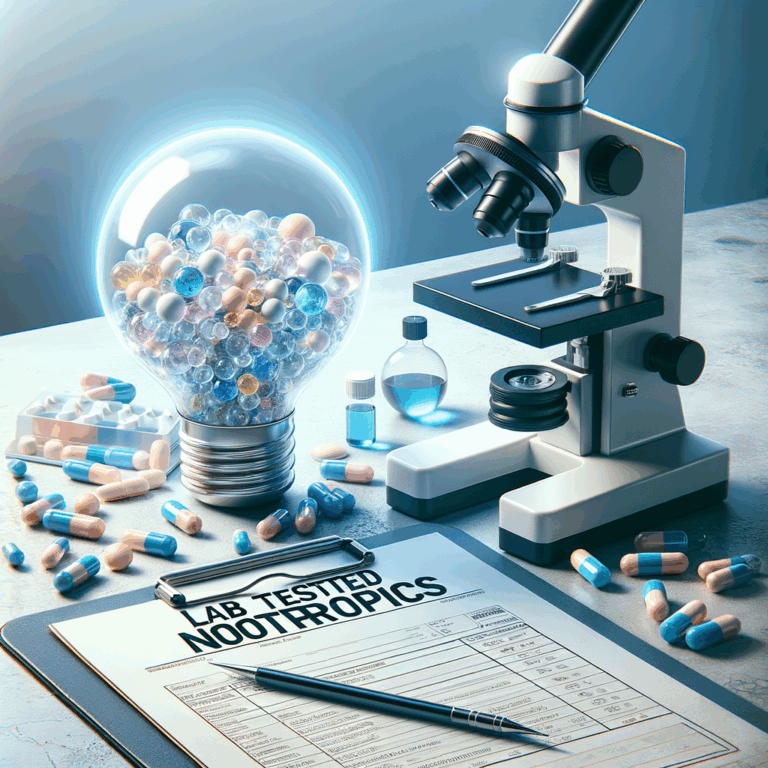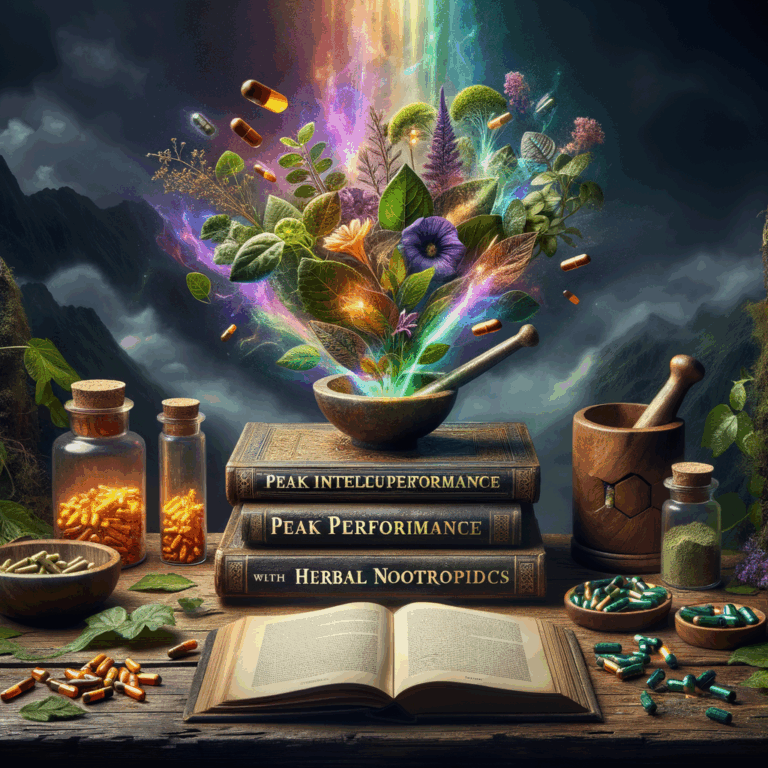- What Are Nootropics?
- How Do Nootropics Work?
- Benefits of Nootropics for Studying
- Improved Focus and Concentration
- Enhanced Memory Retention
- Boosted Creativity
- Popular Nootropics for Studying
- 1. Caffeine
- 2. L-Theanine
- 3. Bacopa Monnieri
- 4. Rhodiola Rosea
- 5. Noopept
- Recommended Dosages
- Side Effects to Consider
- Natural vs. Synthetic Nootropics
- How to Incorporate Nootropics into Your Study Routine
- Mindful Usage
- Combine with Healthy Habits
- Monitor Your Progress
- Alternatives to Nootropics
- Mindfulness Meditation
- Time Management Techniques
- Exercise
- Conclusion
- FAQs
- 1. Are nootropics safe?
- 2. How long does it take for nootropics to work?
- 3. Can I take multiple nootropics at once?
- 4. Do nootropics have long-term effects?
- 5. Can I develop a tolerance to nootropics?
- 6. Can students use nootropics without prescription?
- 7. Are there any side effects from using nootropics?
- 8. Can I rely solely on nootropics for studying?
- 9. Are natural nootropics better than synthetic ones?
- 10. What’s the best nootropic for students?
- References
What Are Nootropics?
Nootropics are substances that enhance cognitive function. They can help improve memory, creativity, focus, and motivation. This makes them popular among students and professionals who need to study efficiently. With the growing interest in optimizing brain function, nootropics have gained significant attention.
These compounds range from natural herbs to synthetic drugs. Natural nootropics like Ginkgo Biloba and Panax Ginseng have been used for centuries. On the other hand, modern nootropics, such as racetams, have emerged from scientific research. Understanding the different types of nootropics can help you choose the best ones for studying.
How Do Nootropics Work?
Nootropics influence the brain’s neurotransmitters. Neurotransmitters relay messages between neurons. By modulating these chemicals, nootropics can enhance brain function. For instance, some nootropics increase dopamine levels, which boosts focus and motivation. Others may improve blood flow to the brain, enhancing overall cognitive function.
Moreover, many nootropics have antioxidant properties. These properties protect the brain from oxidative stress. When your brain is healthy, its performance improves significantly. Increased energy and clarity help you absorb and retain information more effectively.
Benefits of Nootropics for Studying
Improved Focus and Concentration
One of the main benefits is enhanced focus. When studying, distraction is a common issue. Nootropics can help filter out distractions, allowing you to concentrate. A product like L-Theanine, for example, can promote a state of relaxed alertness.
You will likely find it easier to engage in deep work. This means you can fully immerse yourself in a complex subject. Your ability to stay on task can significantly affect your academic performance.
Enhanced Memory Retention
Memory retention plays a crucial role in studying. Nootropics can enhance both short-term and long-term memory. Compounds like Bacopa Monnieri support the formation of new neural connections. This can lead to improved retention of information.
Enhanced memory is especially beneficial during exams. You can recall important facts and concepts quickly. This advantage can make a significant difference in your overall performance.
Boosted Creativity
Some nootropics not only improve focus but also boost creativity. Creativity is essential for problem-solving and innovation. Certain nootropics may help free your mind from conventional thinking patterns. This can lead to new insights and ideas.
When you feel creatively inspired, completing projects becomes easier. You might find new ways to approach subjects or problem sets. This will undoubtedly keep your academic work fresh and engaging.
Popular Nootropics for Studying
1. Caffeine
Caffeine is perhaps the most well-known nootropic. It increases alertness and reduces fatigue. Many students already rely on coffee or energy drinks to study. Caffeine enhances the release of neurotransmitters like dopamine. This can lead to improved mood and cognitive performance.
| Pros | Cons |
|—————————-|——————————-|
| Improves focus | Can cause jitters |
| Boosts energy | May disrupt sleep |
| Increases alertness | Tolerance can build up |
2. L-Theanine
L-Theanine is an amino acid found in green tea. This nootropic promotes relaxation without drowsiness. It works well with caffeine to enhance focus while lowering anxiety. Students often use L-Theanine to maintain a calm state while studying intensely.
3. Bacopa Monnieri
Bacopa Monnieri is a traditional herb known for its memory-enhancing effects. It supports cognitive function and reduces anxiety. Research shows that it can improve information retention and recall. This makes it a popular choice for students preparing for exams.
4. Rhodiola Rosea
Rhodiola Rosea is an adaptogen that combats fatigue and stress. It helps improve mental performance in stressful situations. If you’re facing tight deadlines, Rhodiola can be beneficial. It allows you to stay sharp under pressure.
5. Noopept
Noopept is a synthetic nootropic known for its cognitive enhancements. It is said to improve memory and learning capacity. Users report heightened clarity and focus, making it ideal for intensive study sessions.
Recommended Dosages
Choosing the right dosage is essential for effectiveness. While every individual reacts differently, it’s important to start low and adjust accordingly. Here’s a basic guideline for some popular nootropics:
| Nootropic | Recommended Dosage |
|———————|————————-|
| Caffeine | 100-200 mg |
| L-Theanine | 100-200 mg |
| Bacopa Monnieri | 300-450 mg daily |
| Rhodiola Rosea | 200-400 mg daily |
| Noopept | 10-30 mg daily |
Always consult with a healthcare professional before starting any new supplement.
Side Effects to Consider
While nootropics can offer benefits, they may also have side effects. Each nootropic has its own profile. Here are some potential side effects to keep in mind:
– Caffeine: Jitters, insomnia, increased heart rate.
– L-Theanine: Rare; may cause mild headaches in some individuals.
– Bacopa Monnieri: Upset stomach, diarrhea, fatigue if taken in high doses.
– Rhodiola Rosea: May cause dizziness, dry mouth, or irritability.
– Noopept: Potential for headaches, irritability, or dizziness.
Understanding these side effects can help you make informed choices regarding your nootropic use.
Natural vs. Synthetic Nootropics
When choosing nootropics, consider the source. Natural nootropics often come from plant extracts. They generally have a longer history of use, which means more anecdotal evidence of effectiveness. For example, Bacopa Monnieri has been used for centuries in traditional medicine.
Conversely, synthetic nootropics tend to offer more targeted effects. They can be extremely potent but typically lack long-term studies on their safety. Understanding the differences can guide you in choosing the right nootropic for studying.
How to Incorporate Nootropics into Your Study Routine
Mindful Usage
First, be mindful of how and when to use nootropics. Avoid taking them late in the day. Most nootropics can interfere with sleep. Instead, incorporate them into your morning routine. This timing helps promote focus and energy during your study sessions.
Combine with Healthy Habits
Nootropics work best in conjunction with healthy lifestyle choices. Combine them with proper nutrition, exercise, and adequate sleep. Regular physical activity boosts brain health as well. Eating a balanced diet ensures your body gets the necessary nutrients to function optimally.
Monitor Your Progress
Keeping a study journal can help track your progress. Note your performance before and after using nootropics. This will help you pinpoint which compounds work best for you. Adjust your usage based on your observations for optimal results.
Alternatives to Nootropics
Sometimes, nootropics might not be your preferred path. Many alternatives can also assist with studying effectively.
Mindfulness Meditation
Practicing mindfulness can increase focus and reduce anxiety. Simple techniques like deep breathing can enhance concentration for better study sessions.
Time Management Techniques
Effective time management can help maximize productivity. Techniques like the Pomodoro Technique encourage focused study bursts with breaks in between.
Exercise
Regular exercise improves overall brain function. It releases endorphins and increases blood flow to the brain, boosting cognitive abilities.
Conclusion
Nootropics offer remarkable potential for enhancing cognitive function while studying. With numerous options available, the key is to find what works best for you. Balance your use of nootropics with healthy lifestyle choices for the best results. Pay attention to your mental performance as you incorporate these brain boosters into your routine.
When used mindfully, nootropics can be incredible tools for academic success. As you explore this intriguing realm, you’ll discover how these substances can empower your learning journey.
FAQs
1. Are nootropics safe?
Most nootropics are safe when taken as directed. However, it’s essential to research each compound and consult with a healthcare professional.
2. How long does it take for nootropics to work?
Effects can vary. Some nootropics, like caffeine, can work within minutes, while others may take weeks to exhibit noticeable effects.
3. Can I take multiple nootropics at once?
Yes, but it’s crucial to research potential interactions. Start with one and gradually add others to monitor how they affect you.
4. Do nootropics have long-term effects?
Research is ongoing. Some studies suggest many nootropics have lasting benefits, while others may require ongoing use to maintain effects.
5. Can I develop a tolerance to nootropics?
Yes, particularly with stimulants like caffeine. Tolerance can reduce their effectiveness over time.
6. Can students use nootropics without prescription?
Most over-the-counter nootropics don’t require a prescription. However, consult a healthcare professional before starting.
7. Are there any side effects from using nootropics?
Yes, side effects can occur. Common ones include headaches, insomnia, and digestive issues, depending on the specific nootropic.
8. Can I rely solely on nootropics for studying?
Nootropics should complement a healthy lifestyle and study habits. Use them as a tool, not a crutch.
9. Are natural nootropics better than synthetic ones?
Both types have benefits. Natural nootropics generally have a longer history of safe use while synthetic options may offer more potent effects.
10. What’s the best nootropic for students?
There’s no one-size-fits-all. Caffeine and L-Theanine are popular choices for focus and relaxation. Experiment to see what works best for you.
References
1. Healthline on Nootropics
2. Nootropics Expert
3. Verywell Mind
4. WebMD on Bacopa Monnieri
5. Examine on L-Theanine



